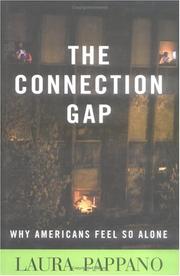| Listing 1 - 10 of 68 | << page >> |
Sort by
|
Book
ISBN: 1789847591 1789847583 Year: 2020 Publisher: London, England : IntechOpen,
Abstract | Keywords | Export | Availability | Bookmark
 Loading...
Loading...Choose an application
- Reference Manager
- EndNote
- RefWorks (Direct export to RefWorks)
Social isolation. --- Exclusion, Social --- Isolation, Social --- Social exclusion --- Social psychology --- Alienation (Social psychology) --- Social distance
Book

ISBN: 9788024628660 802462866X 9788024619835 8024619830 9788024619835 Year: 2011 Publisher: [Prague, Czech Republic]
Abstract | Keywords | Export | Availability | Bookmark
 Loading...
Loading...Choose an application
- Reference Manager
- EndNote
- RefWorks (Direct export to RefWorks)
Publikace Psychické deprivace v detství J. Langmeiera a Z. Matejcka zaznamenala ji po svém prvním vydání v r. 1963 znacný ohlas. Prulomová práce, ve které autori citují díla západních expertu i výsledky z vlastní praxe s ohroenými detmi, popisuje pojem psychické deprivace u detí v ústavní péci a nepríznivých rodinných pomerech. Metodologicky dukladné dílo se nezastavuje u odborného posouzení problému, ale klade do popredí zájmy dítete a humanistický prístup.Oba autori se u nás významne zaslouili o to, aby se péce o oputené deti sestávala z vhodné kombinace péce ústavní a podporované péce rodinné ci pestounské. Ovlivnili té zakládání prvních SOS detských vesnicek.Psychická deprivace v detství je stále doporucovanou základní literaturou pro studenty psychologie, pedagogiky a sociologie, ocení ji vak kadý, kdo se venuje problematice ohroených detí. Ctvrté vydání díla je opatreno predmluvou profesorky Vágnerové a aktualizovaným výberem literatury k tématu.
Psychology --- Social Sciences --- Parental deprivation. --- Social isolation. --- Exclusion, Social --- Isolation, Social --- Social exclusion --- Social psychology --- Alienation (Social psychology) --- Social distance --- Deprivation, Parental --- Deprivation (Psychology) --- Parent and child

ISBN: 0202250687 Year: 1973 Publisher: Chicago, Ill.
Abstract | Keywords | Export | Availability | Bookmark
 Loading...
Loading...Choose an application
- Reference Manager
- EndNote
- RefWorks (Direct export to RefWorks)
Developmental psychology --- Social psychology --- 159.922.2 --- Social isolation --- Exclusion, Social --- Isolation, Social --- Social exclusion --- Alienation (Social psychology) --- Social distance --- Ecologische psychologie --- Social isolation. --- 159.922.2 Ecologische psychologie

ISBN: 9287154600 Year: 2004 Volume: 46 Publisher: Strasbourg Council of Europe
Abstract | Keywords | Export | Availability | Bookmark
 Loading...
Loading...Choose an application
- Reference Manager
- EndNote
- RefWorks (Direct export to RefWorks)
Marginality, Social --- Poor --- Marginalité --- Pauvres --- Poverty --- Social isolation --- Marginalité --- Exclusion, Social --- Isolation, Social --- Social exclusion --- Social psychology --- Alienation (Social psychology) --- Social distance --- Destitution --- Wealth --- Basic needs --- Begging --- Subsistence economy
Book
ISBN: 1442699442 1442644222 9781442699441 9781442644229 9781442644229 Year: 2013 Publisher: Toronto
Abstract | Keywords | Export | Availability | Bookmark
 Loading...
Loading...Choose an application
- Reference Manager
- EndNote
- RefWorks (Direct export to RefWorks)
With a range of social, artistic, economic, political, and literary perspectives, the contributors provide a lively exploration of the tensions and opportunities of life in the Hellenistic Mediterranean.
Hellenism. --- Belonging (Social psychology) --- Social isolation --- Greece --- Mediterranean Region --- Civilization --- Civilization. --- Exclusion, Social --- Isolation, Social --- Social exclusion --- Belongingness (Social psychology) --- Connectedness (Social psychology) --- Social belonging --- Social connectedness --- Social psychology --- Alienation (Social psychology) --- Social distance --- Social integration
Book
ISBN: 2865864421 9782865864423 Year: 1996 Publisher: Saint-Agne Erès
Abstract | Keywords | Export | Availability | Bookmark
 Loading...
Loading...Choose an application
- Reference Manager
- EndNote
- RefWorks (Direct export to RefWorks)
Isolation [Social ] --- Isolement social --- Politiek [Sociale ] --- Sociaal isolement --- Sociale politiek --- Sociology of social care --- Community organization --- Social stratification --- Social problems --- Social isolation --- Poverty --- Social policy --- EXCLUSION SOCIALE --- REPRESENTATION SOCIALE --- INTEGRATION SOCIALE --- PAUVRETE --- POLITIQUE PUBLIQUE

ISBN: 0387326995 1461498023 9786610743858 1280743859 0387327002 Year: 2007 Publisher: New York (N.Y.) Springer
Abstract | Keywords | Export | Availability | Bookmark
 Loading...
Loading...Choose an application
- Reference Manager
- EndNote
- RefWorks (Direct export to RefWorks)
As both an early disciple of and influence on Freud, Wilhelm Stekel enjoyed a unique position within the analytic movement. More recently, he has been notable more for his ostracism from Freud’s sphere and little else. The Self-Marginalization of Wilhelm Stekel brings a fresh perspective on Stekel, revealing the complex, symbiotic bond between mentor and follower in its many social, interpersonal, and psychological forms.In addition to shedding light on a famous outsider, this biography is set in a dual context of the formative years of psychoanalysis and Freud’s relationships with his colleagues: comparisons and contrasts abound with Adler, Jung, and other, revered exiles from Freudian circles. At the same time, each chapter defines and identifies a particular aspect of the marginalization process, including self-marginalization, the relationship of marginals to the mainstream, and the value of marginalization in the construction of identity. In all, this book will provide An in-depth look into the social history of psychoanalysis An informed re-thinking of Stekel’s contributions as theorist and clinician A new view of marginalization as differentiated from similar social phenomena Previously unpublished correspondence between Freud and Stekel A new translation of Stekel’s 1926 essay, "On the History of the Analytical Movement" The Self-Marginalization of Wilhelm Stekel peels back layers of history to create a singular addition to our knowledge of the origins of psychoanalysis. Psychologists, social scientists, and readers interested in the history of science will find this book an illuminating glimpse into the lives and legacies of the first psychoanalysts.
Psychoanalysis --- Social isolation. --- Hulpwetenschappen --- History. --- Antropologie en cultuur. --- Stekel, Wilhelm, --- 159.9 --- Psychologie --- Exclusion, Social --- Isolation, Social --- Social exclusion --- Social isolation --- Social psychology --- Alienation (Social psychology) --- Social distance --- History --- Bojan, Willy, --- Serenus, --- Stekel, William,
Book
ISBN: 1610447107 9781610447102 9780871543325 087154332X Year: 2011 Publisher: New York
Abstract | Keywords | Export | Availability | Bookmark
 Loading...
Loading...Choose an application
- Reference Manager
- EndNote
- RefWorks (Direct export to RefWorks)
National news reports periodically proclaim that American life is lonelier than ever and generate considerable anxiety about the declining quality of American's social ties. This book challenges such concerns by asking a simple yet significant question: Have Americans' bonds with family and friends changed since the 1970's, and, if so, how? Noted sociologist Claude S. Fischer examines long-term trends in family ties and friendships and paints an insightful and ultimately reassuring portrait of Americans' personal relationships. This book analyzes forty years of survey research to address whether and how Americans' personal ties have changed- their involvement with relatives, the number of friends they have and their contacts with those friends, the amount of practical and emotional support they are able to count on, and how emotionally tied they feel to these relationships. The book shows that Americans today have fewer relatives than they did forty years ago and that formal gatherings have declined over the decades- at least partially as a result of later marriages and more women in the work force. Yet nether the overall quantity of personal relationships nor, more importantly, the quality of those relationships has diminished. Americans' contact with relatives and friends, as well as their feelings of emotional connectedness, has changed relatively little since the 1970's. Although Americans are marrying later and singly people feel lonely, few Americans report being socially isolated and the percentage who do has not really increased. The author maintains that this constancy testifies to the value Americans place on family and friends and to their willingness to adapt to changing circumstances in ways that sustain their social connections. With so many voices heralding the demise of personal relationships, it's no wonder that confusion on this topic abounds. An engrossing and accessible social history, this book brings a much-needed note of clarity to the discussion. Americans' personal ties, this book assures us, remain strong. -- Inside Cover
Communities --- Social interaction --- Social isolation --- Friendship --- Families --- Social networks --- Interpersonal relations --- Community --- Social groups --- Exclusion, Social --- Isolation, Social --- Social exclusion --- Social psychology --- Alienation (Social psychology) --- Social distance --- Affection --- Friendliness --- Conduct of life --- Love
Book
ISBN: 1800713525 9781800713543 180071355X 1800713541 9781800713550 9781800713529 Year: 2021 Publisher: Bingley Emerald Publishing Limited
Abstract | Keywords | Export | Availability | Bookmark
 Loading...
Loading...Choose an application
- Reference Manager
- EndNote
- RefWorks (Direct export to RefWorks)
Cabin fever occurs at sea, on land, in the air, in space. Principally, it occurs in our minds. This book examines 'cabin fever' in the wake of the coronavirus pandemic and the greatest confinement of people to their homes in history. It provides a timely account of the threat of cabin fever during lockdown.
Social isolation --- Psychological aspects. --- Exclusion, Social --- Isolation, Social --- Social exclusion --- Social psychology --- Alienation (Social psychology) --- Social distance --- Social isolation - Psychological aspects. --- Social isolation - Health aspects. --- Imprisonment - Psychological aspects. --- Imprisonment - Health aspects. --- Imprisonment

ISBN: 0813529794 Year: 2001 Publisher: New Brunswick, N.J. Rutgers University Press
Abstract | Keywords | Export | Availability | Bookmark
 Loading...
Loading...Choose an application
- Reference Manager
- EndNote
- RefWorks (Direct export to RefWorks)
Sociology of culture --- Affective and dynamic functions --- Social psychology --- United States --- Alienation (Social psychology) --- Alienation [Social ] --- Aliénation (Psychologie sociale) --- Aliënatie (Sociale psychologie) --- Aliënatie [Sociale ] --- Disaffection (Social psychology) --- Eenzaamheid --- Estrangement (Social psychology) --- Isolation [Social ] --- Isolement --- Isolement social --- Loneliness --- Rebellen (Sociale psychologie) --- Rebelles (Psychologie sociale) --- Rebels (Social psychology) --- Seclusion --- Sociaal isolement --- Social alienation --- Social isolation --- Sociale aliënatie --- Sociale vervreemding --- Solitude --- Vervreemding [Sociale ] --- United States of America
| Listing 1 - 10 of 68 | << page >> |
Sort by
|

 Search
Search Feedback
Feedback About UniCat
About UniCat  Help
Help News
News